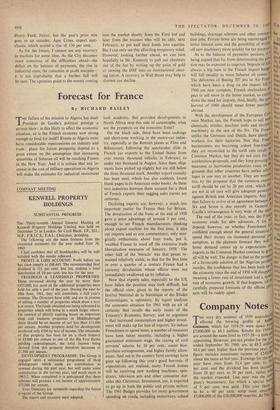Forecast for France
By RICHARD BAILEY THE failure of his mission to Algeria has dealt President de Gaulle's political prestige a serious blow : is this likely to affect the economic situation, or is the French economy now strong enough to fend for itself? Events in Algeria must have considerable repercussions on industry and trade: plans for future prosperity depend to a great extent on the assumption that increasing quantities of Saharan oil will be reaching France in the New Year. And it is certain that any in- crease in the cost of military operations in Algeria will make the estimates for industrial investment look academic. But provided developments in North Africa stop this side of catastrophe, what are the prospects on the economic front?
On the black side, there have been sackings and short-time working in the motor-car indus- try, especially at the Renault plants at Flins and Billancourt, following the spectacular slide in French car exports to the United States from over twenty thousand vehicles in February to under two thousand in August. Since then, ship- ments have picked up slightly but are still below the three thousand mark. Another export casualty has been steel, which has also suddenly found blank pages in its American order books. As these two industries between them account for a third of French exports their sagging sales curves are ominous.
Declining exports are, however, a much less important matter for France than for Britain. The devaluation of the franc at the end of 1958 gave a price advantage of around 3 per cent., enough to set French manufacturers thinking about export markets for the first time; it also cut imports and as one commentator, only mar- ginally enthusiastic about freer trade, put it, 'enabled France to ward off the extensive trade liberalisation measures of January, 1959.' The other half of the 'miracle' was that prices re- mained relatively stable, so that for the first time in over a quarter of a century France had a currency devaluation whose effects were not immediately swallowed up by inflation.
Now that exports sales, especially to the US, have fallen the position may look difficult, but the official view, given in the reports of the Institut National de la Statistique et des Etudes Economiques, is optimistic. Its report analyses • the economic situation for 1961 with an air of certainty that recalls the early issues of the Treasury's Economic Survey; and its argument is that increased consumption and higher invest- ment will make up for loss of exports. To induce Frenchmen to spend more, a number of measures have been taken recently, including a higher guaranteed minimum wage, the raising of civil servants' salaries by 10 per cent., easier hire- purchase arrangements, and higher family allow- ances. And out in the country farm earnings have gone up following this year's good harvests. If expectations are realised, many French homes will be receiving new washing machines, spin- dryers, television sets and other consumer dur- ables this Christmas. Investment, too, is expected to go up in both the public and private sectors. The 1961 Budget provides for more government spending on roads, including motorways, school buildings, drainage schemes and other construe' tion jobs. Private firms are being encouraged.b) lower interest rates and the possibility of wrinai off new machinery more quickly for tax purposes,' As to the balance of payments position, it 15 being argued that far from deteriorating the 13051. tion may be expected to improve. Imports of fuel' always a big item in the French import budget' will fall steadily as more Saharan oil comes lel The deliveries of Boeing 707 jets to Air France. which have been a drag on the import bill la 1960 are now complete. French steelmakers ew pect to sell more in the home market, so cutnaS down the need for imports. And, finally, the go"4 harvest of 1960 should mean fewer purcha0 abroad.
With the development of the European Cole' mon Market, too, the French hope to sell in°, chemicals, textiles, machine tools and electrical machinery to the rest of the Six. The Frencbi unlike the Germans and Dutch, have plenty" workers for their factories. Not that Freflel! businessmen are becoming ardent free-traders' they are reconciled to the tariff cuts inside t14 Common Market, but they do not care for WI acceleration proposals, and they keep pressing f° measures to harmonise production costs on the grounds that other countries have unfair athe eaPi. tages in one way or another. They are worrlet l'ear too, by the proposal that the common extern PO) e, oni tariff .should be cut by 20 per cent., which 1I"' g buil, are not at all sure will give adequate proteetle' against British and American imports. Any lac' boar that failure to arrive at an agreement between °I' chid Six and Seven is due entirely to General grot Gaulle's intransigence is very wide of theroartcb Peri, The end of the year, in fact, sees the Frail LIP economy ready for tiew advances. A lot W1P tax-I depend, however, on whether Frenchmen confident enough about the general situation spend their money on increased personal ell sumption, as the planners forecast they will. 'd home demand comes up to expectations all exports to the Common Market continue to ge‘t all will be well. The danger is that as the prosPev of a favourable solution of the Algerian proble,1 recedes, the confidence that has been built UP I: the economy since the end of 1958 will disanPeajv meaning a lower rate of investment and a sl0ve9 rate of economic growth. If that happens, all the carefully prepared forecasts of the official Plalr ners will be rudely upset.


































 Previous page
Previous page